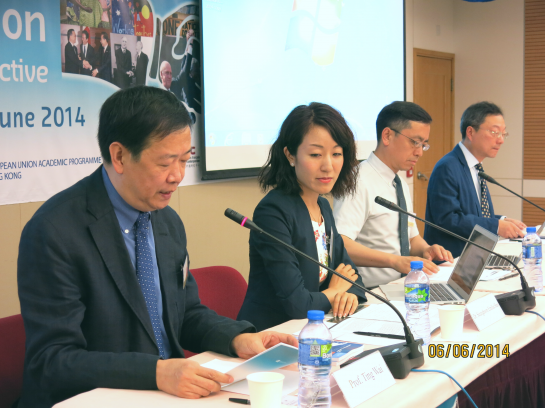- TOP
- >
- Faculty Research
- >
- Center for Global Discovery
- >
- Challenges of Teac...
Challenges of Teaching International Reconciliation in Japan and Korea: A Comparative Perspective
Global Social Science Conference 2014 Political Reconciliation in Comparative Perspective 5‐6 June 2014, Hong Kong
Main Theme
Comparative politics and comparative history are challenging enough. When it comes to comparative reconciliation studies, what are the utilities, limits and precautions? What are some difficulties in teaching reconciliation and using the European ‘model’ in East Asian classroom?

From the left: Chair Ting Wai (Professor, HKBU), Paper Presenters Dr. Seunghoon Emilia Heo (Assistant Professor, Sophia University), Dr. Daqing Yang (Associate Professor, Johns Hopkins University), Guest Discussant Yang Biao (Associate Professor, East China Normal University)
Presentation Abstract
In recent years, comparative reconciliation studies has become à la mode. In an attempt to provide a plausible explanation, if not a possible solution, to the unsuccessful cases of international reconciliation, academia has been focusing on comparing Northeast Asia to Europe, in other words, the successful German foreign policy of reconciliation to the unsuccessful Japanese one (See, for instance, Berger 2012; Heo 2012; Gardener-Feldman 2010; He 2009; Lind 2008; Horvat 2007). Many political elites made historical analogies in order to promote reconciliation as well. Zbigniew Brzezinski, former US National Security Advisor to President Jimmy Carter, presented the Franco-German case as the example to follow for the future of Polish– Ukraine relations during his visit to Lviv in Ukraine in 1998. Helmut Kohl, German Chancellor from 1982 to 1998, often expressed his wish to achieve with Poland the kind of historic reconciliation that Konrad Adenauer had achieved with France. Ion Iliescu, former Romanian president, suggested in 1995 that ‘Romania and Hungary follow the model of Franco-German reconciliation’ (Heo 2012). During his official visit to Norway in September 2012, former South Korean president Lee Myung-bak made a speech at the University of Oslo: “European Peace sets an example for Northeast Asia. Despite the historical and cultural difference, I do not believe that universal ethics for peace is different. In Northeast Asia, we desperately need it as well.” This list is not exhaustive. Nevertheless, those few examples prove the global trend of comparative approach in this field, which has direct influence on the way people and our society shape their perception.
A comparative approach does offer useful insights. But it also runs the risk of misjudgement depending on what and why to compare. This paper discusses the potentials and limits of comparing Northeast Asian and European cases in teaching international reconciliation to Japanese and Korean students. The comparative method used in research does not necessarily lead to the same consequences when applied in the classroom. Teaching peace and reconciliation in Japan and Korea has not been an easy experience. I still remember my first class in Japan when my students asked me: “Sensei, Japan is such a peace-‐loving country. Why are Koreans and Chinese angry at us?” I also remember the one in Korea: “What’s wrong with Japan? Why are they not apologizing for their misdeeds? See what Germany has done!” Neither side showed any space to try to understand why the other side does not think the way they do. In order to make a good use of comparison we need to review the purpose as well as the method of teaching. I will argue in this paper that the comparative approach can be effective only if the course is carefully designed to help students see the issue through the eyes of ‘others’. Based on my teaching and research experience in both countries, I will show that if we want our future generation to play an active role in promoting reconciliation, it is crucial to create a locus where students can learn to understand why the other side does not think the same way one does.
Works Cited
Berger, Thomas (2012). War, Guilt, and World Politics After World War II. Cambridge,
UK: Cambridge University Press.
Gardner‐Feldman, Lily (2010). “German‐Polish Reconciliation in Comparative Perspective: Lessons for Japan?” The Asia‐Pacific Journal 16‐1‐10.
He, Yinan (2009). The Search for Reconciliation: Sino‐Japanese and German‐Polish Relations since World War II. Cambridge, NY: Cambridge University Press.
Heo, Seunghoon Emilia (2012). Reconciling Enemy States in Europe and Asia. Cambridge, UK: Palgrave Macmillan.
Horvat, Andrew (2007). “Obstacles to European Style Historical Reconciliation
between Japan and South Korea – A Practitioner’s Perspective.” In Legacies of World War II in South and East Asia, ed. David Koh Wee Hock. Institute of Southeast Asian Studies: Singapore, 154‐82.
Lind, Jennifer (2008). Sorry States: Apologies in International Politics. New York, NY: Cornell University Press.
An advertisement for this event can be found here:
http://gis.hkbu.edu.hk/gssc-2014/index.html
- Departments
- Archive












